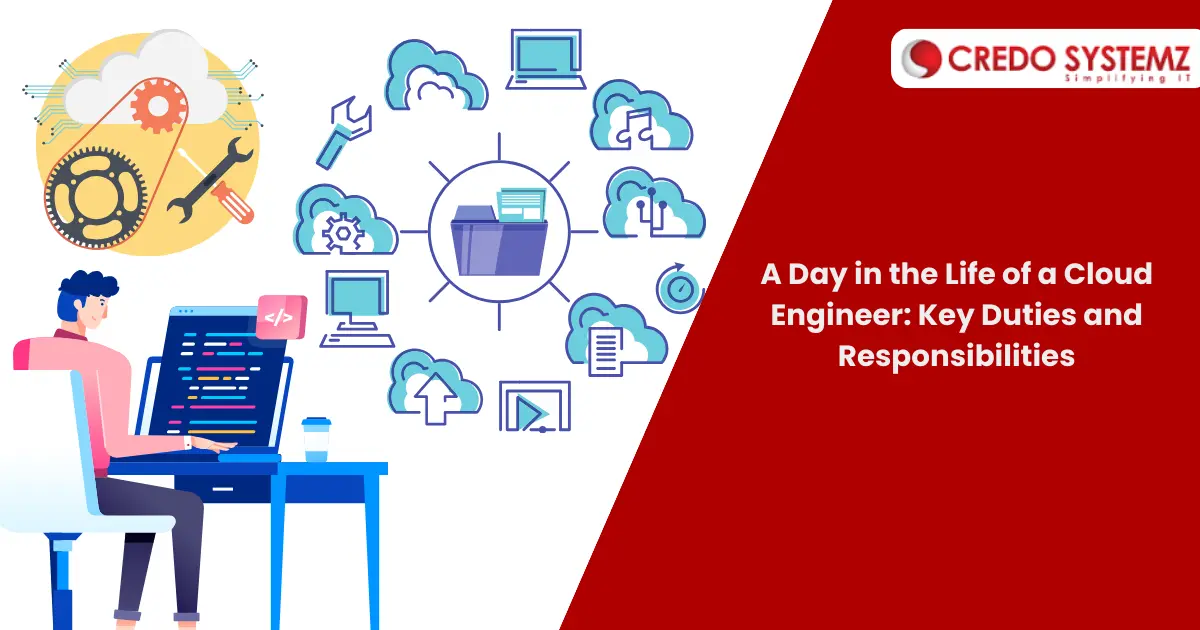
Introduction
To begin, Cloud engineering is one of the fastest growing fields in the tech industry. Cloud engineers are a popular profession who are responsible for designing, implementing, managing, and maintaining cloud based systems. Cloud engineering is a dynamic field, requiring a blend of technical expertise, problem-solving skills, and knowledge of cloud platforms.
Cloud Engineer
Cloud engineer is a promising career role with high demand in the tech field. They are responsible for designing, implementing, and maintaining cloud-based infrastructure using Amazon Web Services (AWS) or Azure platform.
Key responsibilities of Cloud engineers
- Cloud Architecture and Development
- Migration and Deployment
- Networking and Security
- Automation and CI/CD
- Monitoring and Maintenance
1. Architecture and Development
The primary responsibility of Cloud engineers is to design and build the architecture for cloud environments. This includes
- Selecting appropriate cloud services,
- Configuring networks,
- Ensuring security protocols.
They also focus on scalability and cost management to ensure efficient resource use and avoid unnecessary expenses. In this role, engineers develop applications, functions, and databases that run on the cloud. This involves coding and deploying cloud-based applications.
2. Migration and Deployment
Cloud engineers oversee the migration of applications and data to the cloud. This includes planning and executing the transfer from on-premises systems to cloud environments. It ensures minimal disruption and data integrity during the process.
3. Networking and Security
They ensure secure and reliable connections between various resources which includes,
- Setting up virtual networks,
- Managing IP addresses,
- Configuring DNS,
- Implementing security measures and intrusion detection systems.
4. Automation and CI/CD
Implementing automation scripts and continuous integration/continuous deployment (CI/CD) pipelines is crucial for efficient cloud operations. This involves using tools like AWS CodePipeline, Jenkins, and Azure DevOps to automate repetitive tasks and streamline application deployment.
5. Monitoring and Maintenance
Implementing automation scripts and continuous integration/continuous deployment (CI/CD) pipelines is crucial for efficient cloud operations. This involves using tools like AWS CodePipeline, Jenkins, and Azure DevOps to automate repetitive tasks and streamline application deployment.
Specific Skills and Tools for AWS and Azure
AWS
- Services: EC2, S3, Lambda, RDS, VPC
- Tools: CloudFormation, CodeDeploy, CloudWatch, IAM
- Skills: Proficiency in AWS SDKs, knowledge of IAM roles and policies, experience with Terraform for infrastructure as code (IaC).
Azure
- Services: Virtual Machines, Azure SQL Database, Azure Functions, Azure Storage
- Tools: Azure Resource Manager, Azure DevOps, Azure Monitor
- Skills: Familiarity with Azure Active Directory, understanding of Azure network security groups, experience with ARM templates for IaC.
Cloud Engineering Training
Credo Systemz offers the top cloud courses in Chennai. Join the professional courses to gain the knowledge and skills of cloud computing. The trainers are real time professionals who provide practical training. The courses includes,
- AWS course in Chennai
- Azure Training in Chennai
- Azure data engineering training in Chennai
Conclusion
To sum up, being a cloud engineer is one of the best career choices in the IT industry. To become a cloud engineer, Credo Systemz is the most popular platform. The live sessions ensure the industrial skills of the AWS and Azure platforms. Master the skills of cloud computing and avail yourself of a bright career path.
